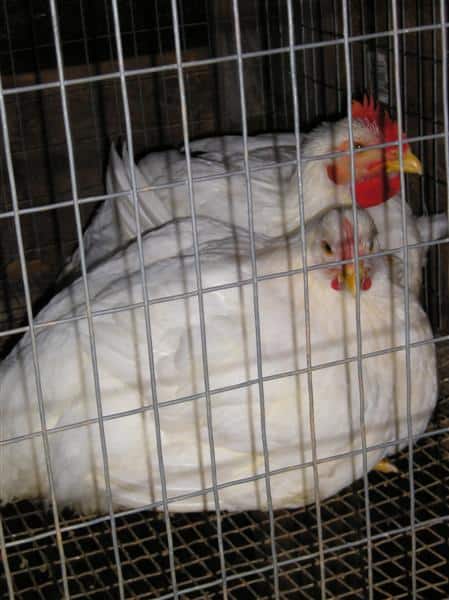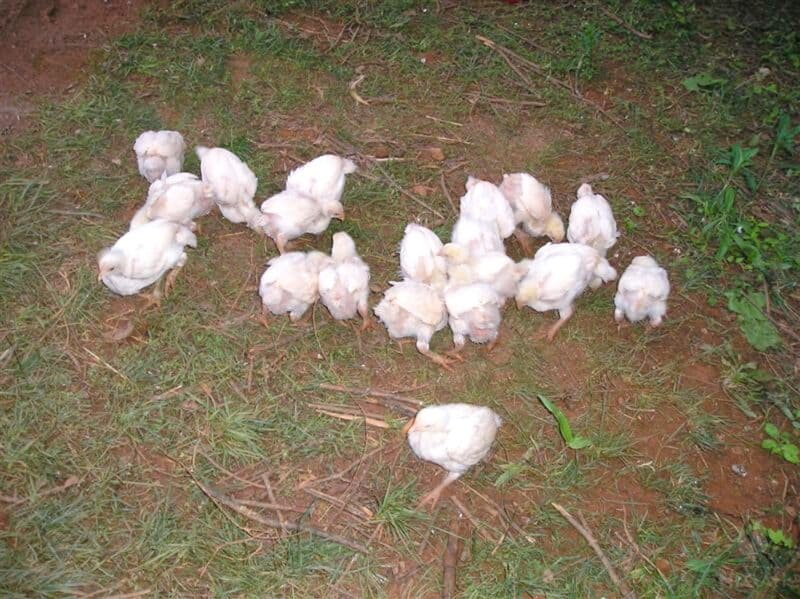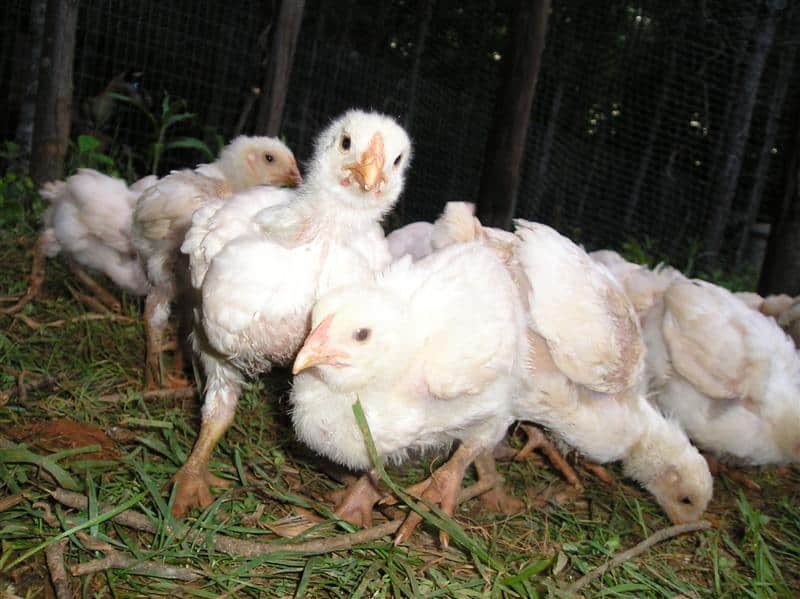Last weekend we went to a local organized Poultry Swap, where people from around the town brought their animals to sell or trade.
Besides chickens, there were also rabbits, goats, and other small animals. We were excited about the event, and went hunting guineas, meat chickens, and turkeys in particular.
We also brought along with us two young roosters we had, hoping to just give them away. They were too scrawny to eat, and no good for anything, really.
In all honesty, I thought we’d be bringing them back home with us! I was very thankful when a lady approached us with a trade proposition…

Our two scrawny, good-for-nothin’ roosters for this pair- two fat meat chickens, a hen and a rooster.
I couldn’t figure out why in the world she’d wanna make a trade like that, but it sounded like a great deal to us! The lady and her husband were very… yuppy-ish looking. Very nice people.
Chickens were more of a hobby for them than anything, and this poultry pair was too boring for their taste. They wanted chickens that were more lively, something to laugh at and enjoy. So, we made the trade.
Initially, we were hoping we could breed the two and have a handful of meat chickens to raise for butcher. But I’ve since been told that they won’t breed. As a matter of fact, they aren’t supposed to live very much longer; the lady told me they are about 6 months old.
So now I’m wondering if we should go ahead and butcher them while we can, or if we should try breeding at least the hen with our Leghorn, Dirty Wilson. What do you think? Then hen isn’t laying… should I wait to see if she will?
We have them separated from the rest of our flock just in case they are carrying a disease or something, though they seem to be fine. Even if we can’t breed them I think we made a good trade. At least we can eat these guys and get a good meal off of them. They sure are fat!!

While at the swap we also ran into these guys. White Leghorn chicks. We weren’t really looking for them, but the man who had brought them was ready to go and offered us 21 chicks for $10. How could we pass that up?
We did notice though, when we got home, that one of the chicks didn’t look so good. It died last night. And two of them have curled toes, though they seem to get around fine so hopefully they’ll be alright. The rest are healthy and happy, so I think we made a good choice getting them.

Unless we were conned and they’re all roosters. That would stink.
Unfortunately, nobody was selling guineas, meat chicks, or turkeys. So, we didn’t get what we went for. But at least we made a good trade and found a good deal… I think.
The kids sure are enjoying the new babies though! That makes it all worth while.

A city girl learning to homestead on an acre of land in the country. Wife and homeschooling mother of four. Enjoying life, and everything that has to do with self sufficient living.

Another idea for cooking aged hens is the pressure cooker. I don’t have one, but I have a friend who swears by it. HTH!
Hi Kendra,
I just wanted to share some information with you that I had printed off a website awhile ago about butchering. Unfortunately, I don’t have the web address, but here’s the info:
“Dual purpose birds [like Buffs–we have some of those, too] are heavy breeds and lay a decent number of eggs, but take a little longer to put on the desired weight to make them worthy of the supper table. However, the longer you wait, the tougher the meat, so you’ll have to cook them in different ways depending on their age.
Butcher between 8 and 12 weeks to be cooked as a broiler or fryer.
From 12 weeks to 6 months, cook as a roaster. After 6 months, the meat will be awfully tough, and these birds are best used as stew birds.
Lighter breeds will never make a meal, but maybe a snack. A breed like a Leghorn is best left to its prolific egg laying. Butcher when their egg production really slows and used the meat to make a wonderful soup that cooks slowly on low heat.”
So we have learned that any of our dual purpose breeds like Buffs and Rhode Island Reds, though they are good sized, will still be really tough if you wait to butcher them when they stop laying. We’ve currently got some our of eggs in the incubator that should be hatching in a couple of days (hopefully–this is our first time!). We’ve had a Buff rooster with our Buff hens, so we’re hoping to get a lot of Buff roosters hatching. They grow to be really good sized within the time frame best for butchering. We’ll butcher the females, too, but the males get so much bigger that we’re hoping for more of those. Good luck with all your chickens. I know having chickens has been a real learning experience for us the last couple of years, but a lot of fun, too.
That’s really great info Pam. Thank you!! It’s nice to know the timeline of how old the chickens are and how to best cook them.
$10 for 21 chicks? Really?
I think that is do-able. I can’t wait to get me some chicks!
We have been raising all natural Pastured Poultry for 5 years, now. I will share with you what we have learned over time: Cornish cross are bred just to eat and grow, and that they do very well. They will be ready for the frying pan in 8 weeks or so. However, breeding them is done, I’m told, artificially, as due to the extremely fast growth, they do not breed naturally very well. Actually, most of them would not survive to fertility age. The good thing about them is that they make the best fryer/broiler meat, and if raised correctly, they will not have health problems.
When we started out we tried getting (as my parents used to do in the 1950s) ‘straight run’ Rhode Island Reds, which are considered a ‘dual purpose’ breed. Supposedly you can use the roosters for food and keep the pullets for laying. What we found is that it took about 5 months for them to get up to size, and by that time the roosters were, by today’s standards, pretty tough for frying. We have been spoiled by the cornish cross that are sold for fryers in the supermarkets, I guess. I’m sure that in the old days they were just fine, that way!
After doing a lot of research we discovered that the quality and healthiness of chickens is more the result of how they are fed than what the breed is, so we have settled on producing Cornish Cross for our discerning customers.
We raise ours on pasture, in bottomless portable pens moved 3 time daily, so that they will have access to fresh grass and not be sitting in their own excrement. We also have learned that their health problems are due to gaining wt. too fast, not to any sort of bacteria,etc. They actually grow so fast that their heart and legs cannot keep up with the growth, and they give out.
Therefore, we have learned to take their feed away from them at night, or to feed a lower protein feed after about 5 weeks old. I believe that the fact that they also get their fill of natural grass and bugs daily, that they are healthier and overcome the natural tendencies to have leg or heart problems.
I would suggest that you butcher those two as soon as possible; you will enjoy the meat and will not likely ever be able to raise more of them as parents.
Luana,
I can’t tell you how much I appreciate you sharing your experience and wisdom!! Thank you!! We definitely need to do our research before we get more into raising meat birds. Our leghorns haven’t had much meat, and the roosters have been very tough. They are the only ones we’ve butchered so far. We have a few Buffs that aren’t laying any longer that we are about to put in the freezer. They are good sized hens, so hopefully they’ll have a lot of meat and not be too tough. We’ll see!! Looks like we have two Cornish chickens to process first though 😉
My 13 yo son, our resident chicken/duck guy, said you can wrap band aids around their curled toes and they will straighten out within a day or two if they are young and their bones are still soft.
Cindy, that’s interesting! Tell your resident chicken guy/son thanks 🙂 I’ll have to give that a try!
Hi, Its me again, go on and butcher them before they die. These birds are not meant to be kept much longer than 12 weeks, after that point they will not gain much more weight. We have actually been thinking of getting some parent stock and raising our own cornish cross. If we do this I will share our choices with you. Thanks for all your sharing and info. Kim
I just had to say that last picture looks like the chicks were doing the hokey pokey! ROTFLOL!!!
Even if the chicks turn out to be roosters, $0.50 each is a bargain for meat, though leghorns don’t put on a lot of weight. I think it was a good deal either way.
Hi Kendra,
I have never heard of a animal swap.That is neat.I highly recommend just butchering your meat birds right away.When we first started meat birds we had no idea that they grew so fast and so one day we went out and they were just stumbling around so my husband had to shoot them as we thought they were sick.Shortly after my uncle told us that they were fine just too fat to stand up anymore.We felt so bad.
We have also had one lay eggs once and they were just terrible.Really you should just butcher them soon.Nikki
Meat birds are bred to be butchered. We keep ours only 5-6 months and when we do butcher they are ready to go and we’re ready to be rid of them.
There are different types of meat birds though. We got some cornish rock once that were very healthy and we kept some of the hens. We try to get only cockerels because the meat is much leaner. The hens did lay, but we never hatched any of those eggs and they were certainly not broody. If anything they were the drop and run hens. The cornish rock x giants are not good to keep because they will become lame mostly and then you’ll lose them anyway to sicknesses. Check it out, if they are moving around well and are not showing signs of lameness then you could maybe keep them. The hen will probably lay… eventually… but it may be less money just to put them in the freezer and get some meat bird chicks. They’ll eat you out of house and home and they lay rather small eggs.
As far as entertainment… I thought those lazy meat birds were some of the most entertaining. They don’t sit down neatly… they plop down in a little puff of dust. When they walk, they waddle like a duck. When the roosters start crowing they sound like they are being strangled. We have had some good belly laughs at those poor meat birds’ expense.
We ordered 25 meat birds this year and 15 more Rhode Island Red pullets. We hope to butcher some of our old hens and clean up the egg laying crowd this fall. We just butchered 4 roosters and 2 drakes from last years chicks that hatched. The problem with letting your hens hatch their own is you get a mix and it’s hard to tell them apart in the beginning, then you end up feeding them until you can tell them apart. We aren’t good at sexing the birds even though I’ve read books and watched a video on how to do it. I’ve had people say, “Oh it’s easy you just have to….” but that has not been the case for us.
We went to a chicken swap last year and sold 4 hens that had been given to us as chicks for $5 each. They were good laying hens. We wanted to find some RIR’s to replace them, but didn’t find any. It didn’t work out well for us, but we may sell our americauna hen that we picked up last year. She is laying, but intermittently. If we got a good trade for her it may be profitable, but we’re not selling her for $5… I think we may ask for $10.
I hope your leghorns work out well. They are great egg layers and we’d have them here except they don’t do well in the extremely cold winters we have. The roosters can be quite aggressive too.
Sorry this is so long. Just don’t get me started on chickens.
It’s nice to hear your experience, Mrs. D!!
When my husband and I first acquired chickens, we got some “meat birds” peeps from the local farm store and found out quickly that they had all sorts of health problems related to their large size. Breeding for traits that will not sustain them, only make them gain weight rapidly so they can be butchered before they cost too much to feed is a shame. The birds’ legs, hearts, etcetera will not be able to get them through a long life. Watching them suffer through that existence or die is miserable. You are a practical farm gal so I recommend you butcher them before you walk out one morning to a cold lifeless body that will only be good for compost.
I attended my first small animal swap meet a couple months ago (Jacob’s Cave, Versailles, MO) and was overwhelmed at how many people were in attendance. I sold four roosters (two silkies, one polish crested, and another kind which escapes me now) within 30 minutes of my arrival. I purchased two Peahens and a young male guinea who all did great but I was careful to observe the animals an ensure their health. I saw some animals that didn’t look well (the guy said they were stressed) and even though many others on his trailer looked fine, I passed him up altogether. We plan to attend the next meet in June and hope to take newly hatched flying mallards and come home with a goat or two.
This farm stuff is so much fun!! I’m so glad that you are enjoying it too.